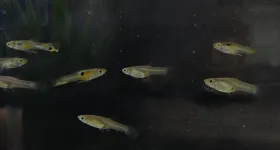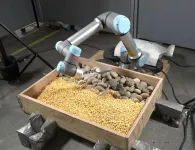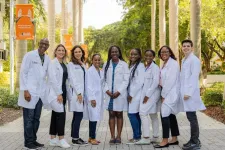Scientists developing way to make cheaper Lithium batteries
2023-07-12
(Press-News.org) Lyon, France: Lithium is becoming the new gold, with rocketing use in lithium-ion batteries in electric cars, computers, and portable devices driving up the price and affecting the supply of the relatively rare metal. Scientists are on the verge of developing a way of using sodium to replace some of the lithium, so driving down costs and guaranteeing the supply.
Recently scientists have looked at dispensing with lithium altogether and instead using sodium or other elements in high quality batteries. Sodium is cheaper and more available (it’s found in seawater, as sodium chloride), but they have disadvantages, and lithium batteries remain the best, in terms of delivering the concentrated charge needed to power cars and portable devices. Ph. D student Tullio Geraci and Professor Alexandra Navrotsky from Arizona State University have adopted a different approach; mixing lithium and sodium in the same battery. promises to ease supply problems and open the way to cheaper batteries and a more secure supply chain.
The group is making lithium-sodium materials and characterizing their structures, homogeneity, and thermodynamic properties. The researchers use a specialized technique developed and optimized in the Navrotsky laboratory (High temperature oxide melt solution calorimetry) to measure the energetic stability of the materials, while heating experiments determine their possible decomposition in use.
Presenting their findings at the Goldschmidt geochemistry conference, Tullio Geraci said “We have been mixing small amounts of sodium with lithium, and testing it for stability, and then seeing how it performs. It’s a step-by-step process, and when we first started the stability was not promising - the first thing we need is to see if the mixture stays in a usable form. But as we increased the sodium content stability improved. So far, we have achieved a 10% mixture, and it seems fine, it’s still thermodynamically stable. We believe can push this up to around 20% before we see any significant difference in performance”.
Tullio Geraci continued, “At first we were unsure whether these Li/Na dilutions could even be made. Surprisingly, we found that weak dilutions tend to break down, the solutions lose their homogeneity and the crystal structure which is important to produce a battery. But as we increase the amount of sodium the material becomes more stable. After we have arrived at the optimum mix, we need to turn our findings over to battery technologists to produce the first sodium-lithium batteries. We believe these are the first steps in developing a new battery technology”.
Commenting, Professor Nancy Ross (Department of Geosciences, Virginia Tech, Blacksburg VA) said, “The research by Geraci and Navrotsky highlights how geochemistry can be applied to developing new materials of technological importance. Their research opens a promising avenue to explore alternative, more affordable and sustainable sources for Lithium batteries that we depend upon in our daily lives.”
Professor Ross was not involved in this work, this is an independent comment.
This represents work in development, and has not yet been peer-reviewed.
The Goldschmidt Conference is the world’s main geochemistry conference. It is a joint congress of the European Association of Geochemistry and the Geochemical Society (US). It takes place in Lyon, France, from 9-14 July. Almost 5000 delegates are expected to attend. https://conf.goldschmidt.info/goldschmidt/2023/goldschmidt/2023/meetingapp.cgi
For background – notable comments:
“Lithium and rare earths will soon be more important than oil and gas” 2022 State of the European Union address European Commission President von der Leyen
Elon Musk: ‘Lithium Batteries Are the New Oil’ https://www.barrons.com/articles/tesla-elon-musk-energy-batteries-51657745667
ENDS
END
ELSE PRESS RELEASES FROM THIS DATE:
2023-07-12
This year’s Presidential Symposium places plant science within a larger context, spotlighting the connections between plants and humanity. Accordingly, ASPB President Gustavo MacIntosh selected speakers with a broad array of backgrounds and expertise. Yet when the Presidential Symposium takes place Saturday, August 5, at 1:30 pm, you’ll find they agree on critical fundamentals.
“Humans are totally dependent on plants for food,” began Barbara Schaal of Washington University.
“When it comes to agriculture, plants and people are really ...
2023-07-12
Tiny fish called Trinidadian guppies have surprised scientists when faced with the so-called “volunteer’s dilemma”.
The idea of the dilemma is that individuals are less likely to cooperate if they are in a large group.
Various studies have demonstrated this in humans – but guppies appear to buck the trend.
In the new study, by the University of Exeter, guppies in larger groups were more likely to risk approaching a predator to gather information for the shoal.
“When faced with a possible predator, guppies have to balance risks,” said Rebecca Padget, from Exeter’s Centre for Research in Animal Behaviour.
“At least one ...
2023-07-12
An investment of £53 million in six research centres will drive forward change in the energy system and help to meet the UK’s net zero target by 2050.
The energy research centres will boost knowledge, create innovative green technologies and reduce demand for energy to achieve greener, cleaner domestic, industrial and transport energy systems.
UK Research and Innovation (UKRI) has awarded:
£15 million for a new Energy Demand Research Centre that will provide solutions for energy demand reduction, understand the impact on consumers, and enable equitable policy decision-making.
£17.5 ...
2023-07-12
Mars rovers have teams of human experts on Earth telling them what to do. But robots on lander missions to moons orbiting Saturn or Jupiter are too far away to receive timely commands from Earth. Researchers in the Departments of Aerospace Engineering and Computer Science at the University of Illinois Urbana-Champaign developed a novel learning-based method so robots on extraterrestrial bodies can make decisions on their own about where and how to scoop up terrain samples.
“Rather than simulating how to scoop every possible type of rock or granular material, ...
2023-07-12
An estimated 50 million individuals in the United States struggle with the challenges of cocaine or alcohol use disorders, according to the National Institutes of Health (NIH). Beyond the well-documented health risks, addiction to these substances detrimentally affects our cognitive flexibility, which is the ability to adapt and switch between different tasks or strategies. Although previous research has hinted at this connection, the underlying reasons for this cognitive impairment remain elusive.
Cognitive flexibility is a crucial element in various domains of our life, including ...
2023-07-12
AURORA, Colo. (July 11, 2023) – Researchers at the University of Colorado Anschutz Medical Campus have found that cannabidiol (CBD), often used to treat anxiety and nausea, can potentially harm a developing fetus.
The paper was published in Molecular Psychiatry today.
People consume cannabis or a non-psychoactive component cannabidiol (CBD) to help with nausea and anxiety during pregnancy because they think it is safe and healthy. But CBD crosses the placenta and accumulates in the fetal brain.
Until now, no one knew how fetal exposure to CBD affected brain development, said Emily ...
2023-07-11
Fine particulate matter comes from wood burning, power generation, motor vehicles and other combustion sources that emit tiny particles into the air. At only 2.5 micrometers or smaller, these particles are small enough to be inhaled and cause lasting damage to the heart and lungs. Known as PM2.5, exposure to these particles is a leading mortality risk factor in India and the surrounding region of South Asia.
A new study by researchers in Randall Martin’s lab in the McKelvey School of Engineering at Washington University in St. Louis evaluated the contribution of various emission sectors and fuels to PM2.5 mass for 29 states in India ...
2023-07-11
Daniel Becker, Ph.D., an assistant professor of Biology in the Dodge Family College of Arts and Sciences, has received an Oak Ridge Associated Universities Ralph E. Powe Junior Faculty Enhancement Award for his continued research on bat migration in western Oklahoma.
“We’re studying migratory Mexican free-tailed bats and the pathogens they might carry that are possible threats to human or wildlife health,” Becker said. “This award allows us to purchase the microchips we implant in the bats and ...
2023-07-11
MIAMI, FLORIDA (July 11, 2023) – “Please, please do it (cancer screening), if not for yourself, then for the next generation. We need to see the day when we end cancer.”
Those are the impassioned words of Charinus Johnson-Davis, who was diagnosed with breast cancer a dozen years ago but is now cancer-free after a double-mastectomy and 28 rounds of chemotherapy plus radiation. She is on a mission to help address cancer disparities affecting Black women and men, and is one of the first to enroll in the African Cancer Genome Registry, a new study at Sylvester Comprehensive Cancer ...
2023-07-11
New York (July 11, 2023) — The American Geriatrics Society (AGS) supports the recently announced decision from the Centers for Medicare and Medicaid Services (CMS) to require the collection of real-world information via a registry to study monoclonal antibodies directed against amyloid for the treatment of Alzheimer's disease. This decision applies to monoclonal antibodies that receive traditional approval from the Food and Drug Administration (FDA). Currently, lecanemab (trade name ...
LAST 30 PRESS RELEASES:
[Press-News.org] Scientists developing way to make cheaper Lithium batteries






